Fylde Farm Reformatory School for Boys, Poulton-le-Fylde, near Blackpool, Lancashire
In the early 1900s, the management committee of the Manchester and Salford Reformatory at Blackley began to make plans to move the establishment to a larger and more rural site. They acquired 80 acres of farmland at Poulton-le-Fylde, near Blackpool, where purpose-built accommodation was erected. The foundation stone for the new buildings was laid at a ceremony on July 16th, 1904, by James Rait Beard, J.P., Chairman of the Manchester and Salford Society for the Reformation of Juvenile Criminals (or, as worded on the stone, "Juvenile Offenders"). The architect was Mr Higginbottom.
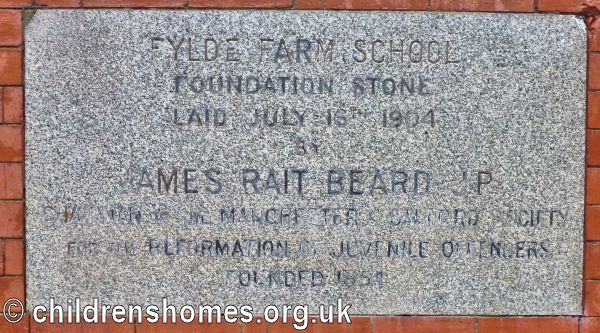
Fylde Farm foundation stone, Poulton-le-Fylde, 2013. © Peter Higginbotham
On June 1st, 1905, eighty boys from Blackley were transferred to the new premises, now named Fylde Farm, which which was officially certified on August 25th, 1905, to accommodate up 130 boys. The main building, arranged around three sides of a quadrangle, included dormitories, workshops, gymnasium etc.
The School site is shown on the 1911 map below.
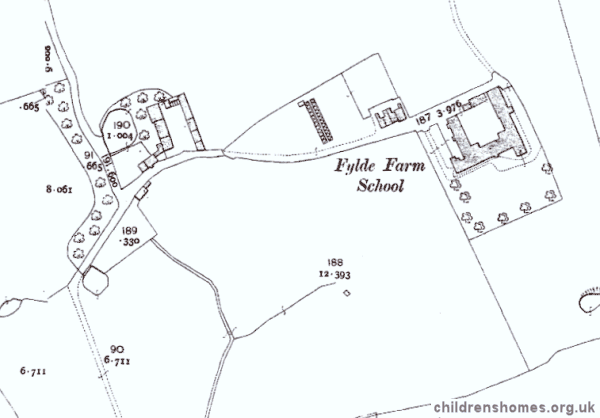
Fylde Farm site, Poulton-le-Fylde, c.1911.
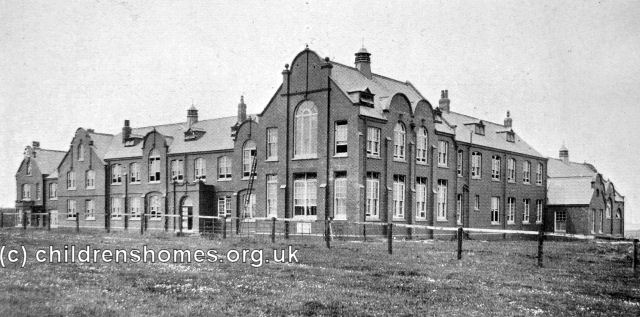
Former Fylde Farm main block from the south-east, Poulton-le-Fylde, c.1903. © Peter Higginbotham
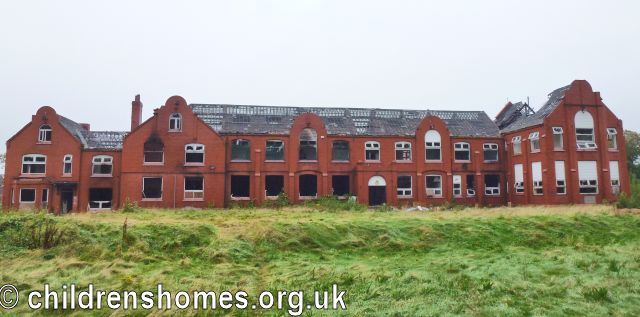
Former Fylde Farm main block from the south, Poulton-le-Fylde, 2013. © Peter Higginbotham
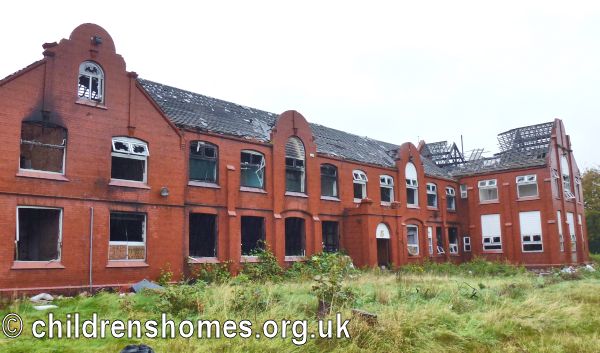
Former Fylde Farm main block from the south-west, Poulton-le-Fylde, 2013. © Peter Higginbotham
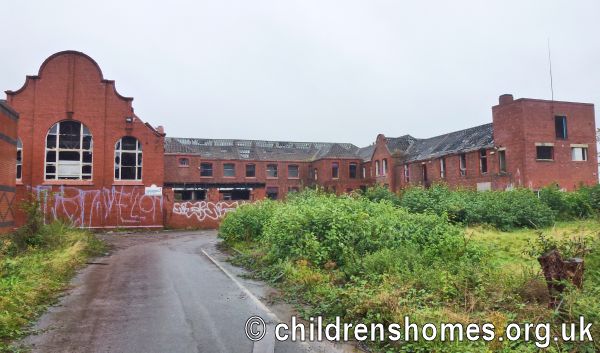
Former Fylde Farm main block from the north, Poulton-le-Fylde, 2013. © Peter Higginbotham
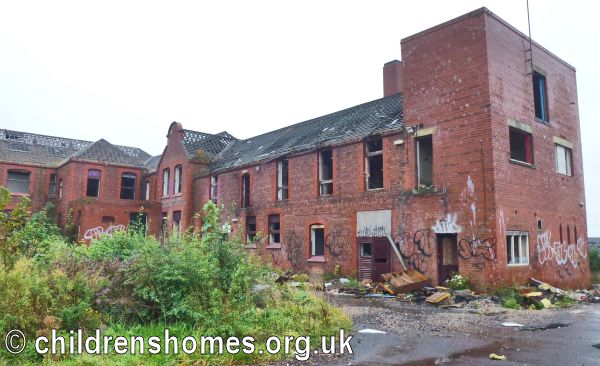
Former Fylde Farm main block from the north-east, Poulton-le-Fylde, 2013. © Peter Higginbotham
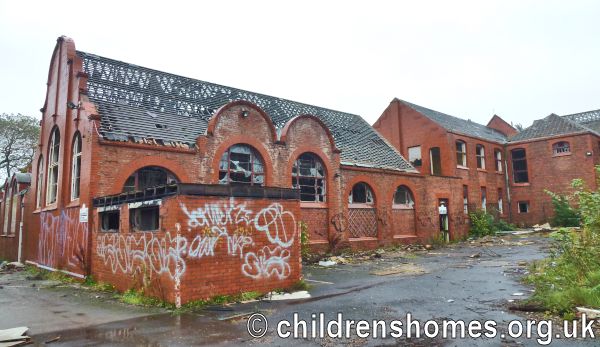
Former Fylde Farm chapel and main block from the north-west, Poulton-le-Fylde, 2013. © Peter Higginbotham
Mr and Mrs A.B. Waite, who had been appointed as superintendent and matron on June 1st, 1904, transferred with the School on the move from Blackley. However, they departed on September 15th, 1905, and were replaced by Mr and Mrs C.S. Potter. The other staff at the new establishment were the head schoolmaster (Mr Thomas C. Gibbs), the assistant schoolmaster (Mr F. Faunthorpe), farm bailiff, shoemaker, tailor, carpenter, bandmaster and gymnastics instructor, baker and cook, two gardeners, engineer, laundress and domestic.
In 1910, industrial training at the School included farm work, gardening, tailoring, shoemaking, carpentry and baking. The whole School had a daily session in a course of "free gymnastics on the most up-to-date army system". Cricket, football and athletics were encouraged, and there was a small library. The School's band was rated as "quite first-class". In July, the School went into camp for ten days at Llandrillo. A doctor visited the School frequently and conducted a stripped examination every two months, while the boys' teeth received regular attention from a dentist. Disciplinary offences in 1910 included four cases of absconding and fifteen of stealing. Three boys broke out of the hospital at night and did considerable damage to school property. A mark system was in use whereby good behaviour could earn rewards and privileges.
A new schoolroom was built in 1912 at the north-east corner of the main block.
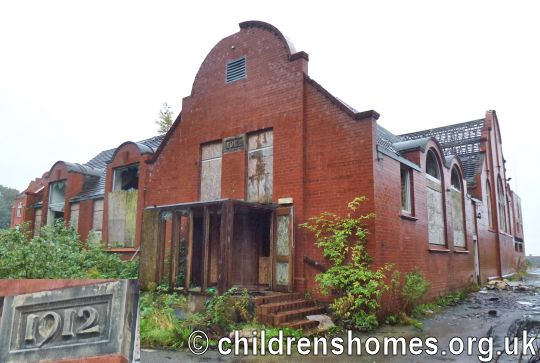
Former Fylde Farm schoolroom, Poulton-le-Fylde, 2013. © Peter Higginbotham
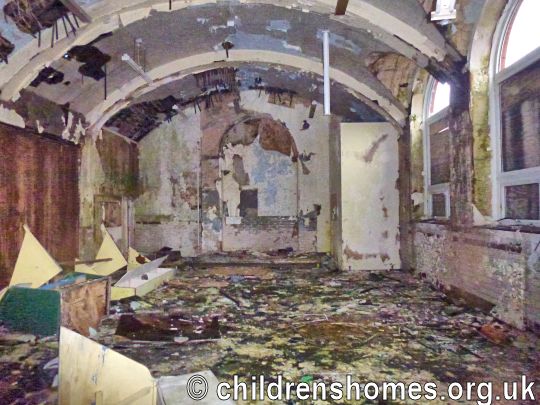
Former Fylde Farm schoolroom interior, Poulton-le-Fylde, 2013. © Peter Higginbotham
A block of staff cottages was located to the west of the main building.
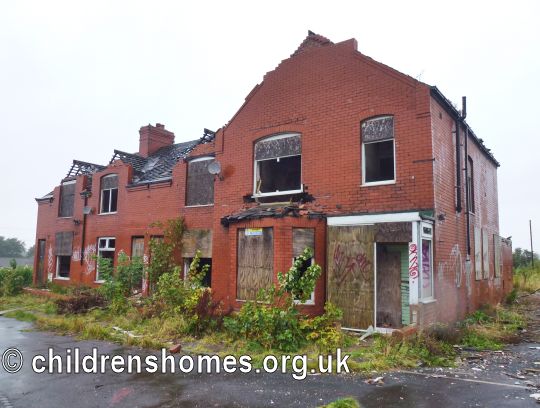
Former Fylde Farm staff quarters, Poulton-le-Fylde, 2013. © Peter Higginbotham
In 1933, Fylde Farm became an Approved School, one of the new institutions introduced by the 1933 Children and Young Persons Act to replace the existing system of Reformatories and Industrial Schools. The Fylde School accommodated up to 130 Senior Boys aged between their 15th and 17th birthdays at their date of admission. In 1952, according to the School's headmaster, Mr H. Hamer, the boys could learn farming, market gardening, three types of building trades, hotel work, cooking, or physical training instruction leading to a career in the forces.
Further additions to the premises included a hard-surface sports pitch at the north of the main building, with a long building, presumably for workshops, running alongside.
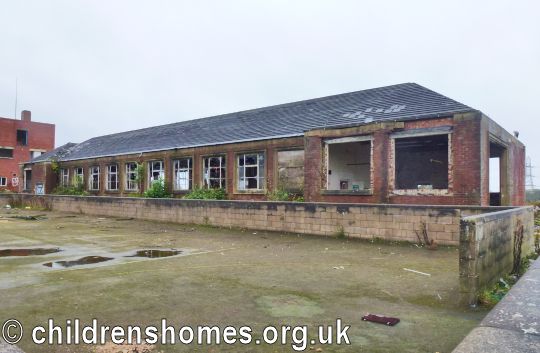
Former Fylde Farm sports pitch and workshops, Poulton-le-Fylde, 2013. © Peter Higginbotham
In 1973, the school became a Community Home with Education (CHE) under the control of Lancashire County Council. After the Fylde School's eventual closure in the 1990s, the site was taken over by the Emmanuel Christian School which closed in around 2010. The site was then left standing empty.
The Manchester and Salford Society for the Reformation of Juvenile Criminals has now evolved into the North West Young People's Development Trust, supporting the care, treatment, education and training of young people throughout England.
Records
Note: many repositories impose a closure period of up to 100 years for records identifying individuals. Before travelling a long distance, always check that the records you want to consult will be available.
- Lancashire Record Office, Bow Lane, Preston, Lancashire, PR1 2RE. Holdings (covering both the Blackley and Poulton sites) include: Committee and Governors' Meeting Minute books (1853-1951); Printed annual reports (1856-1888); Superintendent's journal (1856-94); Admission registers (1881-1957, 1968-70, partially indexed); Admissions list (1857-72); Admission papers (1924-28); License and discharge book (1857-99); Register of inmates authorized for discharge on license (1978-1936); After-care books (1873-93, 1938-43, 1946-49, 1954-56); Punishment book (1915-38).
Bibliography
- Carpenter, Mary Reformatory Schools, for the Children of the Perishing and Dangerous Classes, and for Juvenile Offenders (1851, General Books; various reprints available)
- Carlebach, Julius Caring for Children in Trouble (1970, Routledge & Kegan Paul)
- Higginbotham, Peter Children's Homes: A History of Institutional Care for Britain's Young (2017, Pen & Sword)
- Abel Smith, Doroth Crouchfield: A History of the Herts Training School 1857-1982 (2008, Able Publishing)
- Garnett, Emmeline Juvenile offenders in Victorian Lancashire: W J Garnnett and the Bleasdale Reformatory (2008, Regional Heritage Centre, Lancaster University)
- Hicks, J.D. The Yorkshire Catholic Reformatory, Market Weighton (1996, East Yorkshire Local History Society)
- Slocombe, Ivor Wiltshire Reformatory for Boys, Warminster, 1856-1924 (2005, Hobnob Press)
- Duckworth, J.S. The Hardwicke Reformatory School, Gloucestershire (in Transactions of the Bristol and Gloucestershire Archaeological Society, 1995, Vol. 113, 151-165)
- Higginbotham, Peter Children's Homes: A History of Institutional Care for Britain's Young (2017, Pen & Sword)
- Hyland,Jim Yesterday's Answers: Yesterday's Answers: Development and Decline of Schools for Young Offenders (1993, Whiting and Birch)
- Millham, S, Bullock, R, and Cherrett, P After Grace — Teeth: a comparative study of the residential experience of boys in Approved Schools (1975, Chaucer Publishing)
Links
- Red Lodge Museum, Bristol — a former girls' reformatory.
- North West Young People's Development Trust
Except where indicated, this page () © Peter Higginbotham. Contents may not be reproduced without permission.


